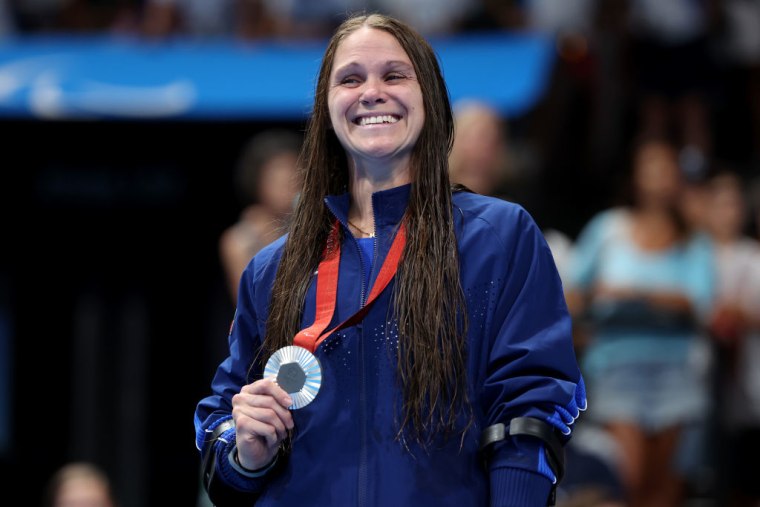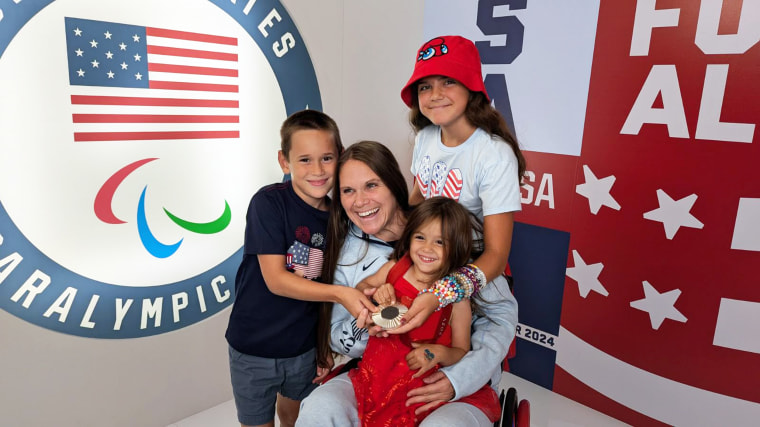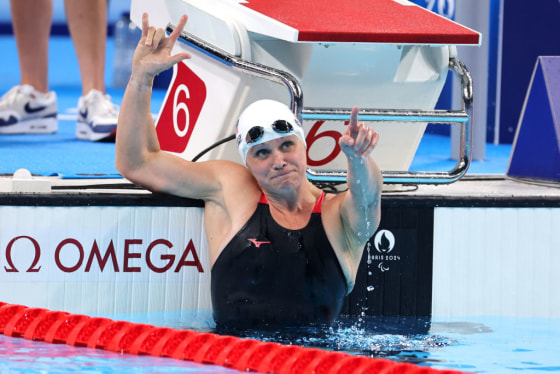I was a collegiate swimmer at Florida State University with dreams of competing in the Olympics. Going to Beijing for the 2008 games was my goal. But in 2007, I was in a car accident where I was struck by a drunk driver, which left me with some instability in my spine. Then I was hit by a car as a pedestrian in 2008, and that accident caused a tumor to start growing in my brain, even though I didn’t know it at the time. Cars don’t like me. I kept swimming, though I could feel something had changed in my body.
I decided to take a break from the sport, and that’s when I had my first daughter. But years later, in 2012, I got back in the pool. I had my sights set on the 2016 Olympics in Rio but then I fell and reinjured my lower back.
And then, in 2018, I was playing in the snow with my kids when a block of ice — of all things — struck me in the head, and the blow caused a cavernoma bleed in my brain. Three weeks later, I had brain surgery. And that is the gist of how I got here — as an athlete who had her sights set on the Olympics throughout her career and is now competing in her first Paralympics at the 2024 games in Paris. (So far, so good.)

Not that it was that simple, of course. Back then, I didn’t know that I was eligible for the Paralympics. I had no idea what the requirements were. It wasn’t that I was hesitant to get into Paralympic sports; I just wasn’t aware it was an option. It was a lack of knowledge, which I think is the case for many athletes who have sustained life-changing injuries.
If I’m being honest, I also didn’t want to admit to the depth of my disability. I had muscle spasms and immobility on my left side, and I tried to hide it. Although I’m in my wheelchair every day, sometimes I walk with forearm crutches if my muscles aren’t as spastic, but it still puts a heavy strain on my body. When I’m competing, I also use a tapper, a guide at each end of the pool who taps me when the wall is approaching because my vision goes blank during hard swims.
It wasn’t until I read more about Michelle Konkoly, a Paralympic swimmer and NBC commentator for the Paralympics, that I began to understand that people don’t necessarily have to look like they have a disability to be disabled. I’ve dealt with bullying because I’m not missing limbs or because people think I don’t “look disabled.” However, when you read about how she fell five stories out a window, you realize that she has an incomplete spinal cord injury that she will have for the rest of her life — forever. I was inspired and in a way, she gave me permission to get back into the pool. Michelle played a huge part in just raising awareness to redefine what a Paralympian looks like. That’s what I hope to do, too. I want to show that Paralympians are more than athletes who are missing limbs. We are not just people in wheelchairs. We are not all blind. There is a spectrum of what makes someone eligible and there are many athletes who are missing out because they just don’t know. I want to help kids, the next generation of Paralympians, to embrace their sport.
My response when people question my disability is that “I’m just that good.” Nick Mayhugh, a Paralympic sprinter with cerebral palsy, helped me find that voice. After he broke a world record and won a gold medal, people said he wasn’t disabled because he wasn’t in a wheelchair. He responded by saying, “I’m just that good.” That’s the nuts and bolts of it. When you’re fast, you’re going to be a lightning rod. And I was fast before my disability.
Sometimes you have to dig deeper to find out an athlete’s story — in my case, to find out that I’m missing part of my brain and that I have a cyst in my spinal cord — and I believe this makes people like me less marketable. For example, I won four events at the Paralympic trials and I did zero media the entire meet. Nobody asked me to do a single interview. Mind you, I am there as a single mom with three kids, getting up early to train while sleeping with a child’s foot in my face all night. Until this essay and my recent profile in The New York Times, I’ve been off the media radar. It’s just been me, my three kids and our little circus show, going through life and figuring it out. But I’m grateful for these media opportunities because they make me more marketable and known, which ultimately, helps me provide for my family.
I’m not just swimming for my kids; I’m swimming for my kids’ future. I’m swimming for them to have a safe and happy childhood. I am swimming for our family to be independent and live a wonderful life.
My kids are my motivation — they are my why. I believe God gave me the ability to swim and there’s not a single person in this world who has more motivation to succeed right now than I do. Because I’m not just swimming for my kids, I’m swimming for my kids’ future. I’m swimming for them to have a safe and happy childhood. I am swimming for our family to be independent and live a wonderful life.

When athletes win Olympic medals, sometimes they choose to give it to someone who’s helped them get to where they are. I want to win a medal so that on a world stage, I can acknowledge my oldest daughter for all that she’s done. She’s babysat for me for hours and hours on end so I can get to the pool and do what I do.
It’s the four of us against the world. My kids are incredible and I am so happy that I got to bring them to France. They want to eat croissants and baguettes and see the Eiffel Tower. They could care less about Mommy swimming. But this is my avenue to give them memories that will last a lifetime.
Every time I travel abroad without them, I’m sad they’re not with me. I don’t want to sightsee when we go places because if there’s something my kids would enjoy, I don’t want to see it without them. My love for them is crazy. It’s my identity. I’m not a swimmer; I’m a mom who swims.
What I have to accept over and over again is that I will never be capable of doing the things that I used to be able to do. I will never be the swimmer that I was, but more importantly, I will never be the mom that I was. I will never run around the playground with my kids or dive into the ocean with my children. Aside from the abilities and bodily functions that I’ve lost, the thing that hurts the most is not being the mom that I used to be. So I hold on to what I can do. They still get a mom who does great things, is a world record holder, and wins gold medals. And that’s why I swim.
